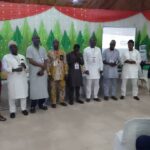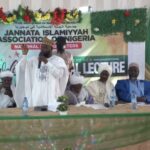For Nigerian disc jockey Dufflebag.theDJ, born Omolola Oyedele, it was her family’s immutable love for music—a memory that many Nigerians like to ascribe to as their introduction to music—that led her to this.
“My parents had a gramophone and boombox in the house and got me a drum when I was six,” shares Dufflebag. It was a giddy way to begin our conversation via the link to a scheduled Google meeting. “The provision of the musical instruments was their response to my creative activities. They observed that I loved to drum a lot. I grew up as a creative person, especially around music, and there’s never in doubt that I’d find myself in the industry,” she explains.
Dufflebag, the sobriquet she has carried since her Law days at Ahmadu Bello University into her shining legal career, now unfurls as her moniker in her new occupation. What started as a hobby has now evolved into a takeover at events, parties, clubs and a blossoming career.
“I’ve always been recognised as an entertainment and intellectual property lawyer, and by virtue of that, many may think that’s my only relationship with music, but I have always created on the side as an instrumentalist, a rapper at a time, a producer and now a DJ.”
In 2022, Dufflebag.theDJ professionally began DJing. Each day that passes, her passion for entertaining social gatherings gets deeper. She opens her audience to African grooves, embracing her calling to spread sounds from the motherland, starting from the United Kingdom, which she moved to almost three years ago. It’s been an exciting journey for the Nigerian DJ.
In this conversation, Dufflebag.theDJ discusses her upbringing and shares her artistic growth, inspirations, and plans for the future.
Tell me about what growing up was like for you.
We played music a lot while growing up. My parents listened to everything from Fela Kuti and Ebenezer Obey to Dolly Parton, Boyz II Men, The Jacksons, and Yinka Ayefele. Additionally, my mom loves art, believing kids learn faster through art. The music my parents listened to was a significant influence.
However, I found Michael Jackson, Cece Winans, Daddy Showkey, Oliver De Coque, Run DMC, Dr. Dre, Queen Latifah, and Pasuma on my own, and their music has also greatly impacted me.
What’s your first interaction with DJing?
I made my first playlist in JSS2. My dad always knew I loved music and got me a Walkman. He asked that I make a list of all the songs I wanted to have on it, and then he burned them into the audio player. It accompanied me to school that year. My mates loved the songs and mix—even the seniors—so much that one of them seized the tape for herself. I’m a natural at curating music and playlists.
Was your plan always to be a DJ?
First, my plan has always been to do music. I taught myself to read and write music. When university time came, I was already head-deep in music, but my parents preferred that I study law. It was not what I wanted, but I did. When I found Entertainment and Intellectual Property Law in Part 3 at University, I fell in love with it. But I have never stopped being an artist and instrumentalist since childhood.
When I decided to make my music professionally — not the person that produces today, plays instruments tomorrow — to earn from my art, it was about three years ago when I switched countries.
When I first moved to the UK, the music I heard when I went out didn’t connect with me. I hardly heard Nigerian music. Understandably, I’m far from home, but I thought if it were indeed “Afrobeats to the world,” the music outside the “Big 3” would also get rotations on some popular stations. That was the turning point for me. I made plans and created a space where people can enjoy only Afrobeats and Amapiano music that centres its rising and unknown artists, mixed with Edits to keep the party going with Afro-fusion vibes. At that point, I finally took the full-time artist route.
Has it been a smooth transition?
It’s been entertaining. I still get surprised when I see people wanting to listen to me. They aren’t surprised to see my posters and hear mixes. They say they’ve always known I’m big on music, and then they turn up. I find it interesting and enlightening because I’ve been quietly, unknowingly building an audience. Also, I’m playing at concerts that may take someone else five years to break into. The first time I ever played in public was at the New Cross in Manchester, a big place for music lovers. It was mind-blowing. The Takeover set I played on Reform Radio in April is also unforgettable.
Now, I get more bookings because I have a reputation for playing Afrobeats and infusing genres like Baile, Funk and Edits.
Does it feel different on the other side of the industry as a creative?
It’s fulfilling. I’ve always made music, but I never just put myself in a place where I moved as an artist. I was on the executive side of music; now, I’m on the creative side. It’s a full-circle moment. Now, I’m entirely doing my artist thing and enjoying it even more because of Afrobeats, despite many artists’ rejection of the tag.
But the transition is also more challenging than it seems. Now more than ever, I’m consciously aware that first, my music is my product, and I have to hawk it myself, whether there’s a marketing team in place or not. Content creation, social posts and engagements are hard work. To be an artist in this era, you must consistently face the camera, smile, jump up and down and other actions to get in the algorithm and people’s faces.
What’s the story behind your stage name?
My friend Jeph called me Dufflebag in 2017, and I had it as part of my name on social media as “Lola with the Dufflebag”. It stuck and came in clutch when I needed a distinctive name for my media outfit, Dufflebag Café. It has since been part of my brand and the name known by friends, colleagues, clients and anybody familiar with my work. So, I adopted it as my stage name too.
How do you mentally prepare for an event and maintain focus until the end?
In a usual Dufflebag set, my first goal is to tell a story with the music. I read my crowd to keep them aware of their reactions and choices. I play a song twice if I have to and take requests if I also have to. I enjoy myself and the groove; most importantly, my listeners or audience are having fun.
Who is your biggest inspiration?
Firstly, it’s my mom. She’s not a DJ but never deferred any of her dreams. She’d do it; if she failed, she’d do it again. Her quality has led me to this point, where I chase my dreams and get inspired by amazing DJs like Uncle Waffles, Major Lazer, Sarz and Black Coffee.
Do you have dream collaborations?
I would love to collaborate with Beyoncé, Major Lazer, Sarz and Burna Boy.
What are you looking forward to for the rest of 2024?
I’ve been making new music and want to put out as much as possible this year. I also want to get collaborations in the bag. Hopefully, I’ll make a mixtape featuring my songs and collaborate with other creatives.
I look forward to giving them rotations on my set, too.
Also, my collective will likely spring up this year. It’d consist of creative and niché DJs with the collective mindset to trailblaze the state of music concerts in Nigeria, from a once-in-a-while experience to regular hours of music entertainment.
What will be the fulfilment benchmark for you at the end of everything?
Following through with my dream as a creative will be my greatest fulfilment.
ALSO READ THESE TOP STORIES FROM NIGERIAN TRIBUNE






